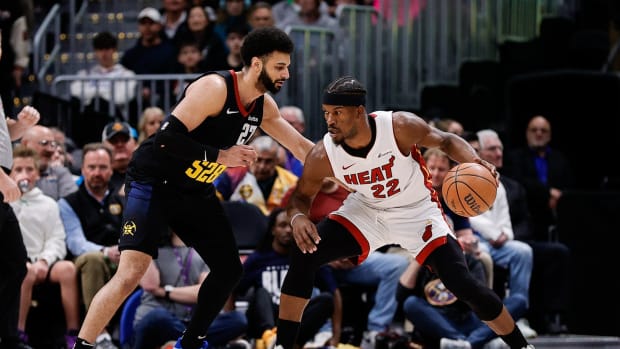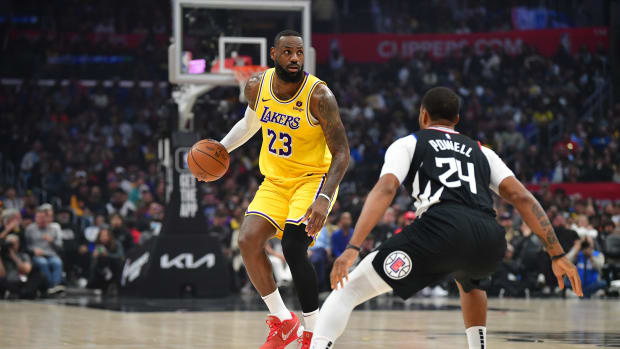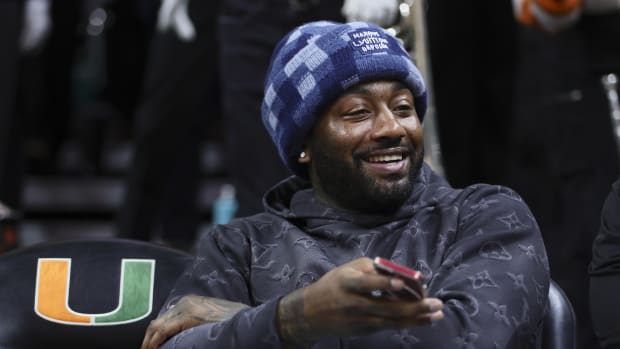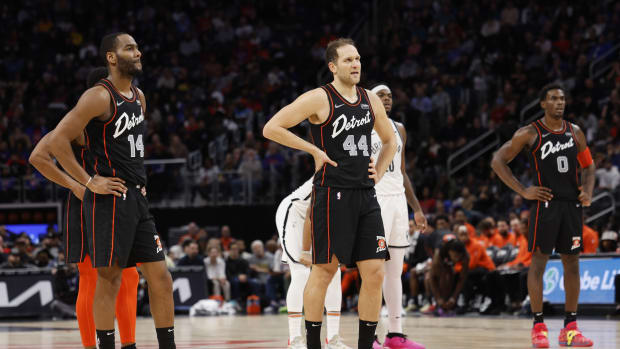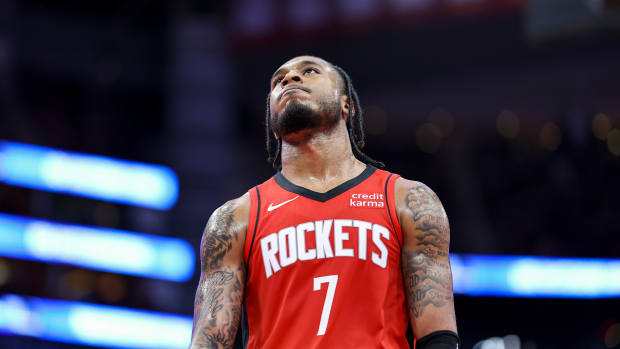The Game Will Miss Kobe Bryant Dearly
By now, we’ve all heard the news: Kobe Bryant and his daughter Gianna were among nine people who died in a helicopter crash in Calabasas, Calif., on Sunday morning.
The whole thing is terrible. It also doesn’t feel real. Partly because there was no preamble, warning or rationale. And partly because this was Bryant. Few athletes have ever seemed more invincible or purposeful. This was the root of his success, of course. That he could make it seem as if random occurrences didn’t plague him as they do the rest of us. That, if you just tried hard enough, you could control everything in your orbit.
As an athlete he had few peers. His work ethic was arguably unparalleled in league history, and he understood the game as few have. He was, by all accounts, a devoted and loving father who approached raising his four daughters as he did most everything else in his life: by striving to do it better than anyone ever has.
Bryant was also accused of sexual assault in 2003, in a case that didn’t go to trial but that led Bryant to release a statement that read, in part, “I want to apologize directly to the young woman involved in this incident. Although I truly believe this encounter between us was consensual, I recognize now that she did not.” A civil case was settled in 2005, and ripple effects continued for years.
His legacy will be determined and debated in the weeks, months and years to come. For now, I think back on the memories.
***
I can’t say I knew Bryant, at least not well. It’s unclear how many truly did. But I got a sense of him while covering the league for more than two decades. I wrote a book chapter about his killer instinct. Shadowed him in China during his final years. Went to Thailand to find his father, Jellybean. In the end, almost every conversation with or about Bryant came back to the same themes: control, self-belief, and never, ever relenting. And that is the side of him I’ll recall most vividly. I’ll remember:
• Brian Shaw telling me that in 1989, he played H-O-R-S-E against Kobe, then 11, and that, as Shaw said, “To this day, Kobe claims he beat me. ... I’m like, right, an 11-year-old kid, but he’s serious.”
• Talking to one of Bryant’s teammates at Lower Merion High School, Rob Schwartz, and learning that Bryant used to convince Rob to stay after practice to play games of one-on-one to 100, with each basket worth one point, winner’s outs, and that Bryant, unmerciful, would sometimes take an 80–0 lead. Rob told me the best he ever did was 100–12. Kobe? He didn’t want to concede that total, saying, in his joking-not-joking way, “I think he’s lying about that.” Rather, Kobe said Rob never got more than five and, this, to me, is perhaps the most telling Kobe moment: that it is important for the record to note that, in a one-on-one game back in high school, he didn’t just beat some poor kid by 88 baskets, but by 95 baskets.
• How exceptional Bryant was as an interview. In our business, we are forever hoping to find great athletes who are also adept at describing why they’re great, but of course these are two totally different skillsets. Bryant was the rare superstar who could veer from minutiae to a 10,000-foot view in the same thought, capable of articulating the most arcane elements of basketball in a way the layperson could understand. He could play the heel, the professor or the sage. Perhaps this was because he rarely showed us the real Kobe—that he was playing a character—or maybe this was the real Kobe. Either way, there’s a reason Chuck Klosterman titled a Q&A with him, “Kobe Bryant Will Always be an All-Star of Talking.”
• His obsession with obsession. Bryant once heard how about how, before Thriller came out, Michael Jackson was obsessed with the Bee Gees and the success of the Saturday Night Fever soundtrack, then the best-selling album of all time. Supposedly, Jackson listened to Saturday Night Fever over and over—10 times a day for two years, until he knew it by heart. Then, a year later Thriller came out, sold 60 million albums and toppled Saturday Night Fever. Upon hearing this, Bryant thought this to be the greatest anecdote ever—“I f---ing love that story”—because it reinforced what he held dear: If you just worked hard enough, and cared enough, and knocked down everything in your path, you could succeed. This became the myth he created and curated about himself.
• His black-and-white view of the world. You were with Kobe or against him. Recently, I spoke to someone who worked with Bryant in his post-retirement pursuits, which have included movies, animation, investing and books. This person said that he learned early on that with Kobe you can either be Shaq and have to fistfight him, or you can be Smush Parker and “he’ll roll you over.” Choose the former and he’ll respect you—but it can be exhausting, for every day required that same battle.
• How he respected those who cared like he did. For example, he loved Manu Ginobili—“a f---ing killer”—and Gregg Popovich. Of the latter, he once told me he’d long dreamed of running through “one of those rigorous practices he does.” Conversely, if you ever needed someone to weigh in on players who weren’t kindred souls, Bryant was your man. When I wrote a feature on Dwight Howard in 2009, I needed someone to comment on how Howard had allowed Nate Robinson to leap over him to win the dunk contest. So I approached Kobe at his locker. Would he ever allow someone to do that? Kobe looked up, aghast. “F--- no!” he said. “Especially not to lose no goddamn dunk contest!”
• The Pop-A-Shot thing. Some years ago, I wrote a story about Ricardo Reyes, a Pop-A-Shot savant who used to go on Jimmy Kimmel and whup various NBA players including, once, Bryant. Months later, I tracked down Kobe to ask him about it. At first, Bryant told me that there was “no correlation” at all between the game and real basketball. And yet, when I asked how he’d do in a rematch, Kobe got that Kobe face. “I’ll wear his ass out if we played again. ... I don’t need no practice. I'll play against him right now and wear his ass out. Wear. His. Ass. Out.”
This was almost certainly false, and likely impossible. But I’m also pretty sure Bryant believed it.
• Kobe telling me before the 2014–15 season that when he returned—after a major surgery, at age 36—he’d actually be better. “Evolved” is the word he used. He also thought people were counting out the Lakers, which at the time consisted of a washed-up Carlos Boozer, Jeremy Lin and little else. “I hear people say, ‘They don’t have a championship team,’” Bryant said. “Yeah, maybe from your perspective, but Boozer does this, Jordan Hill does that, Lin adds that. What’s the best way to put all these pieces together and use them to win? That’s the puzzle to figure out, and if we can figure out that puzzle, we’ll shock a lot of people.” (That team finished 21–61.)
• How every Kobe pep talk was, in essence, the same pep talk. It went like this: “Go out there and kick ass tonight. Do what you do and have a good time, but remember: It’s time to step up to the f---ing plate." (This was the pep talk he gave to one of Jellybean’s low-level players, over the phone, in Bangkok when I was there, much to the surprise of the player.)
There are more memories, of course. But in the end, many of them are the same stories, just in different context. Kobe Bryant was a complex, flawed human being. He was also one of the purest competitors to ever pick up a basketball, or any ball. I met plenty of people who loved Kobe Bryant, and plenty who didn’t. But I don’t think I ever met someone who didn’t respect him as an athlete and competitor. And my guess is that’s what mattered most to Bryant. The game will miss him dearly.
More Coverage of Kobe Bryant's Death:
- Kobe Bryant, Daughter Die in California Helicopter Crash
- For the Bryant Family, An Unimaginable Loss
- Kobe Bryant Left His Mark as a Generational Hero
- Sports World Reacts to Kobe Bryant's Sudden Death
- Remembering Kobe Bryant: Sports Illustrated Covers Through the Years
- Spurs-Raptors Open Game With Shot Clock Violations to Honor Kobe
- Shaq Reflects on Kobe's Passing: "There’s No Words to Express the Pain"
- Remembering Kobe and Gianna: For the Bryant Family, an Unimaginable Loss
- Breanna Stewart Mourns Death of Kobe Bryant






























